
Femininity and masculinity should be variable for each individual instead of contribute to fixed stereotypes
 “I hate Black Widow. She’s a girl, and girls have cooties,” said my cousin, who was then a 6-year-old, rambunctious little boy. I stared back at him in shock and indignance.
“I hate Black Widow. She’s a girl, and girls have cooties,” said my cousin, who was then a 6-year-old, rambunctious little boy. I stared back at him in shock and indignance.
“Do you hate me, too?” I demanded, and he immediately, earnestly shook his head and told me, “You’re different. You’re my big sister.”
My cousin had been experiencing the awkward phase when boys and girls both felt repelled by each other and believed in imaginary “cooties” to ensure the least amount of interaction possible. It was a relatively laughable incident since my cousin is now about to enter the much more awkward stage of liking girls. (Assuming it’s girls he likes.) But this relatively insignificant incident and innocent conversation reminded me of a larger controversy related to little boys seemingly rejecting Black Widow action figures while wholeheartedly accepting the male Avenger superheroes.
I’ve grown up with the Marvel and DC universes through comics, movies, soundtracks and TV shows. I remember visiting Target with my friends a couple of years ago and raiding the toy section, as bored teenagers do. We painfully discovered that the Avengers action figure sets didn’t have Black Widow in them. The spunky, powerful, sarcastic heroine, one of my greatest fictional role models, was hardly present in any of the Marvel toys we scavenged through.
It wasn’t just her who was missing. Gamora was absent from many “Guardians of the Galaxy” merchandise, and a year later, Rey was excluded from many “Star Wars: The Force Awakens” toys. Hasbro, the toy company, has come under fire for many of these controversies, and their excuses have become increasingly weaker — relying on “spoilers” as the reason for excluding integral female characters in products, while the same women’s faces are plastered across the center of movie posters.
It’s important to note that there has been a huge increase in female hero action figures and merchandise in the past year and a half. This proves a very important point — every tweet and lament about this horrible phenomenon was taken into consideration, even the heartfelt, frustrated letter a little girl wrote to Hasbro about the lack of Rey, her favorite “Star Wars” character. I never really liked classic Disney princesses. I like “Star Wars.” I like Marvel. So I’m happy to see more women represented equally in these fictional universes.
Meghan Markle, an actress on the television show “Suits,” spoke recently at a UN Women conference about when she was 11 years old and watched a disturbing Proctor and Gamble Ivory dishwashing soap commercial at school that utilized the phrase “Women all over the world are fighting greasy pots and pans.” She identified the use of words in this tagline as absolutely insensitive and unfair. Most women are busy living their lives, taking care of their responsibilities and working jobs — which makes them too busy to take on the entire burden of functioning as living, breathing dishwashers simply due to societal expectations.
Markle decided to do something about this commercial. She wrote letters to Proctor and Gamble, Hillary Clinton, civil rights lawyer Gloria Allred and Nick News anchor Linda Ellerbee. Eventually the slogan in the Ivory dishwashing soap commercial was changed to “People all over America are fighting greasy pots and pans.”
Fighting gender roles doesn’t only apply to little girls and strong women who dream about living in a society where they aren’t restricted by the rules of how they’re supposed to act. It applies to men and women and everyone in between. Men shouldn’t be forced to act strong, stoic, manly and emotionless. It should be acceptable for men to be vulnerable and sensitive while finding confidence in expressing emotions. Bro culture should no longer exist in workplaces because men shouldn’t feel obligated to embrace hypermasculinity simply to fit into a group. When we strip away the roles with which society expects us to identify, we will start to respect each other regardless of our identities. Our characteristics don’t need to be suppressed or falsified to meet the expectations of a group of people.
Transgender women and men may face the struggle of feeling like they have to embrace the most extreme characteristics of their gender in order to fit in. This creates a toxic environment where many people may feel like they can’t express their gender in subtle ways.
We should all have the freedom to make our own choices regarding our gender identity without having to fit into a checkbox on a form. If you’re passionate about changing the stereotypical role in which society is expecting you to fit, you can always do something about it. Sometimes, speaking out against or for something that you care about can have an immense impact — a concept made obvious by Markle’s letters. We often underestimate our own capabilities as individuals, and we downplay the potential influence we can have on the world. It’s time we decide to mend our society to accept everyone’s identities instead of forcing us to conform to acceptable, predetermined ones.
Written by: Akshita Gandra — agandra@ucdavis.edu
Disclaimer: The views and opinions expressed by individual columnists belong to the columnists alone and do not necessarily indicate the views and opinions held by The California Aggie.








